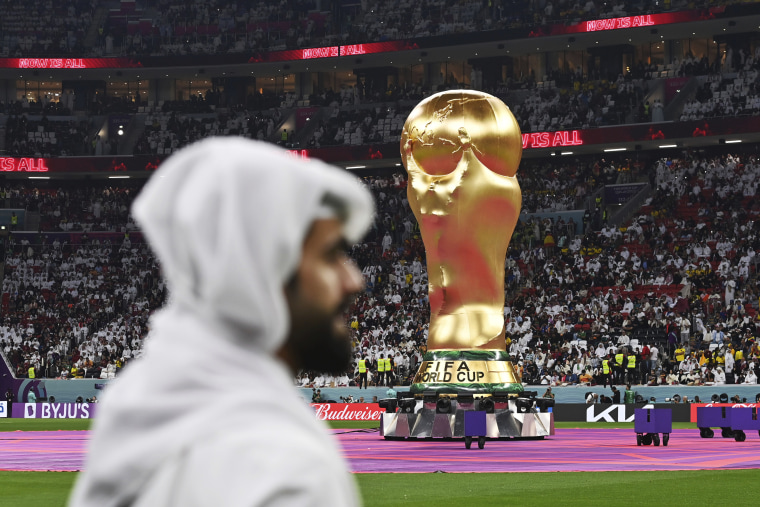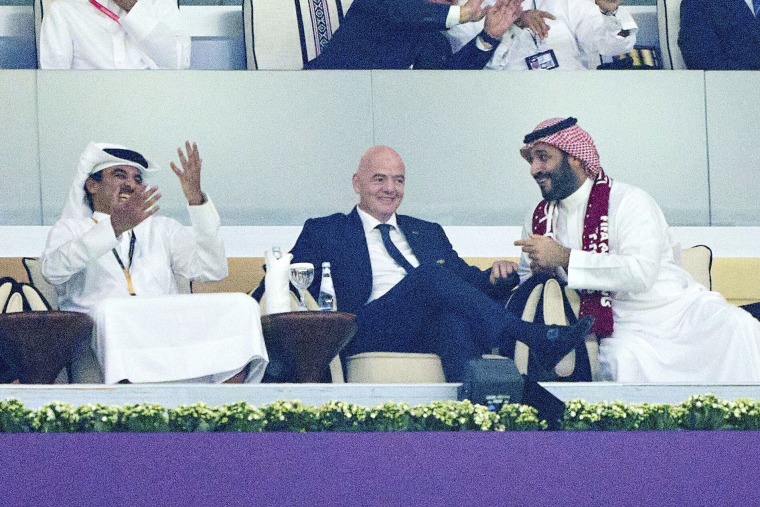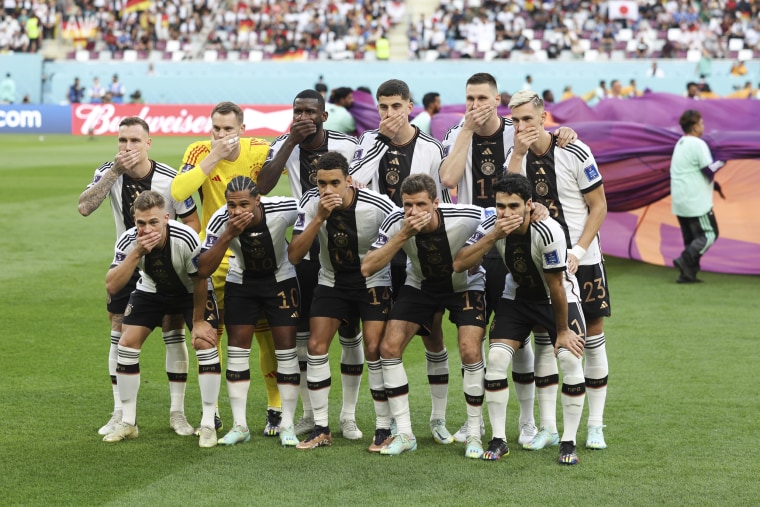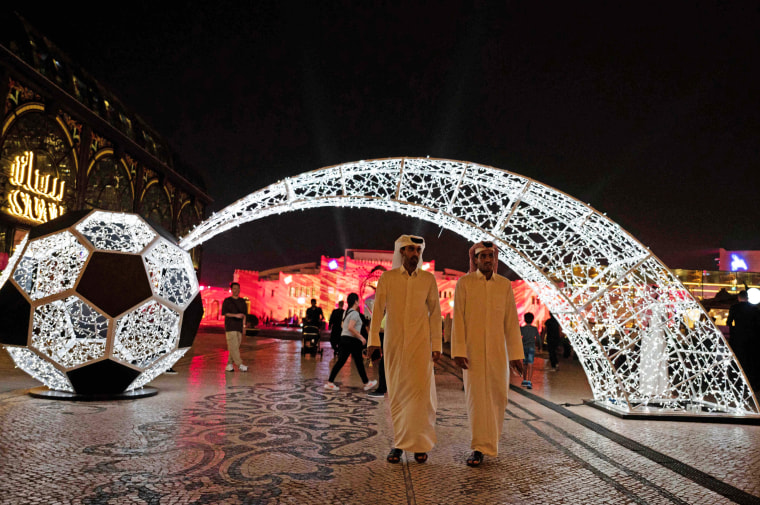DOHA, Qatar — Qatar's soccer World Cup appeared to be a public relations disaster.
The event has become a magnifying glass for the tiny petrostate's human rights record, highlighting rather than airbrushing its treatment of LGBTQ people, women and migrant workers. On the field, the Qatari national team’s performances earned it the sorry record of being the worst showing by a host nation in the competition’s 92-year history.
But for this gas-rich Gulf peninsula, the real spoils of this tournament may be found elsewhere: satisfied visitors, business deals and international recognition that could lead to greater national security.
"Qatar has a plethora of political objectives by hosting this event," said Danyel Reiche, a visiting associate professor at Georgetown University in Qatar, who co-wrote the book "Qatar and the 2022 FIFA World Cup: Politics, Controversy, Change."
Qatar has used soccer to "overcome the invisibility of a small state," he added, allowing it to "become more influential in international affairs."
Other authoritarian states hoping to burnish their global image may also view the event as a potential blueprint. In a fitting finale, France and Argentina will face off Sunday featuring stars Lionel Messi and Kylian Mbappé — both of whom play their club soccer for Qatar-owned Paris Saint Germain in France.

Soccer and 'soft power'
Politics offers perhaps the biggest win for the country, which is about the size of Connecticut and sits across the border from Saudi Arabia and across the Persian Gulf from Riyadh's arch-rival, Iran. Qatar has had reasons to be nervous about its place in the world, having just emerged from a five-year diplomatic and transport blockade led by the Saudis and the United Arab Emirates.
But the World Cup has showcased what has been a remarkable thaw in these Gulf relations, portraying Qatar not as an isolated regional outcast, but a key player that invited its friends to one of the biggest parties on the planet while displaying its increasing influence with the West.
On Monday, UAE leader Sheikh Mohammed bin Zayed Al Nahyan made a surprise visit to Qatar. That followed Saudi Crown Prince Mohammed bin Salman's attendance at the opening ceremony, in which he swapped national scarves with Qatar's emir, Sheikh Tamim bin Hamad Al Thani.
These visiting dignitaries matter, so the theory goes, because if leaders are seen gracing a marquee global sporting event, they are much less likely to blockade, invade or otherwise meddle with that country's affairs. Experts also say that such a concrete show of friendship could pave the way for even greater economic and diplomatic cooperation between these erstwhile local rivals.
“It helps Qatar build soft power by hosting all those leaders and delegations,” said Alexis Antoniades, an associate professor at Georgetown University in Qatar, which is affiliated with the Qatar Foundation, a state-led nonprofit organization. “It’s like you invite me to your house: You show me around and we have a nice day.”

This is the first World Cup in the Middle East, and the first one in a Muslim majority country. Nevertheless, Western fans and pundits were aghast when Qatar decided to ban beer sales from stadium perimeters just 48 hours before the first match, not because they craved alcohol, necessarily, but because it was seen as a highly irregular U-turn so soon before a major event.
However, Antoniades and other experts believe that in doing so, the Qataris were able to "show strength" by indicating they could bend FIFA, world soccer's governing body, to the customs of its conservative Islamic society, even though it would cause a logistical nightmare.
And although most Western officials skipped the opening ceremony, Secretary of State Antony Blinken arrived the next day to watch the United States’ opening game against Wales.
Blinken gave his hosts a verbal slap on the wrist over human rights, but also praised their progress in those areas leading up to the tournament. For such a tiny nation in a neighborhood of regional giants, bolstering its ties with powerful Western allies is also a rationale for Qatar hosting the largest U.S. military air base in the Middle East.
It's not just politicians. Cavalcades of businesspeople have also descended on Qatar to talk cash, construction and natural gas.
In the buffet-gorged hospitality areas of the country's gleaming new stadiums, these magnates will be greasing the wheels of future deals, such as the one announced last week that will see Qatar provide liquified natural gas to Germany for the next 15 years.
Germany, weaning itself off Russian gas, has simultaneously been among the most vociferous critics of Qatar's human rights record.

Life after oil and gas
Most countries use their hosting of a World Cup or the Olympic Games to revamp venues and the related infrastructure. Qatar has done this on an extreme scale, pumping an estimated $200 billion into eight new stadiums, a new metro system, hotels and what is practically an entirely new city, Lusail, built almost from the ground up.
This is the latest evolution for a country whose capital was little more than a sleepy fishing town until the discovery of oil in the 1940s. In the 1970s, it discovered one of the world's largest natural gas fields, making it today the third most prolific exporter behind Russia and the U.S., transforming its previously desert horizon into a glitzy, skyscraper-filled panorama.
But although fossil fuels paid for its riches, Qatar is now planning for life after oil and gas, as the world attempts the difficult switch to green energy.
Like its Gulf neighbors, it wants to become an international hub for diplomacy, business, sports, entertainment — and of course tourism.

Many of the 1 million people who had been expected to make the World Cup journey say they have been impressed by the seemingly safe and welcoming environment put on by their Qatari hosts.
"It’s amazing, honestly, what an amazing job Qatar has done putting this World Cup on," Elias Damouni said outside the Khalifa International Stadium, just outside Doha, for the U.S. men's knockout game against Netherlands on Saturday. Describing the country as "super safe, super fun, super accommodating, and the only thing I can think to say is," he paused to cover his heart, "we really thank the Qataris.”
Another American, David Crabb, was spending the day browsing the Souq Waqif, a marketplace in Doha. "I had no idea what it would be like here but actually it’s been really hospitable," he said. "There’s been a lot of fun to be had at all the games."
Of course, not everyone can enjoy such a carefree experience.
Same-sex relations are illegal in Qatar, and migrant workers have been ill-treated although recent reforms have been commended by the International Labor Organization, a United Nations agency.
In a written statement, a Qatari government official said that "all visitors — regardless of background or beliefs — have been warmly welcomed in Qatar" and that "Qatar does not tolerate discrimination against anyone."
It said the World Cup had been a "catalyst for positive changes in Qatar," namely the improvements in laborers' rights.
The run-up to this World Cup was dominated by debate about Qatar's human rights. But that calmed once the tournament began, with many Western journalists seemingly wooed by the tournament's smooth running and entertaining soccer.
British Prime Minister Rishi Sunak tweeted: "hats off to Qatar for hosting an incredible World Cup so far."
For many in Qatar, the pre-tournament criticisms are seen as an unfortunate distraction from what they see as the real issues.
"Everybody's a little bit upset and frustrated by the Western media coverage," said Antoniades at Georgetown University in Qatar.
"But everybody is proud of what the country has managed to pull off," he said. "It has brought people together, it has brought leaders together who are trying to build things."
He added, "We live in a very volatile world right now, and this is exactly what should be at the center of the World Cup."
Alexander Smith reported from London, Elizabeth Kuhr reported from Doha, Qatar.
